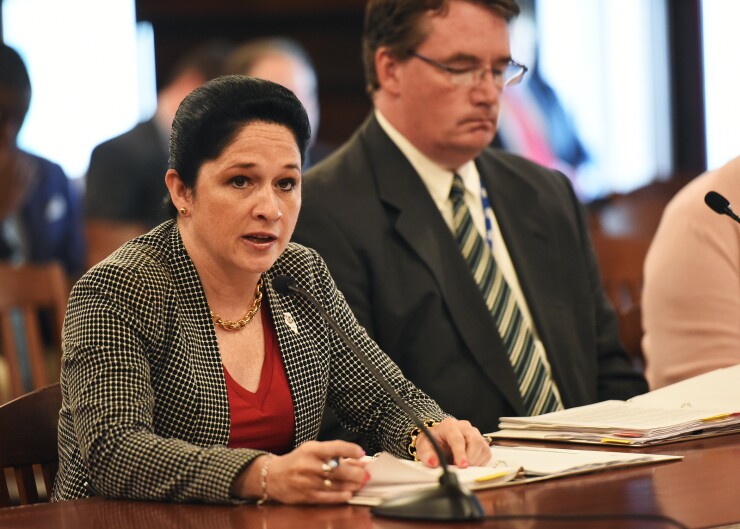CHICAGO – The Illinois comptroller made good this week on a federal court order to begin making $586 million of Medicaid-related payments and paying down a backlog.
Passage of a $36.1 billion fiscal 2018 budget freed up some revenues held in non-general fund accounts allowing Comptroller Susana Mendoza meet the payment obligation without shorting other “core” monthly payment obligations such as debt service, payroll, and pension payments, said Mendoza spokesman Abdon Pallasch.
The state’s current list of delinquent bills stands at $14.6 billion.
A total of $740 million of Medicaid-related bills was paid this week to 11 managed care organizations throughout the state, Mendoza’s office said Wednesday.

“The enactment of a state budget allows my office to begin to address critical payments” to the healthcare networks, Mendoza said in a statement. Mendoza is a Democrat who has been critical of Gov. Bruce Rauner’s stance tying passage of a budget with tax hikes to adoption of his policy and governance proposals.
The comptroller tapped into existing drug rebate funds and used those to leverage federal matching dollars to help cover the payments. The funds were freed up as part of the budget package. The payment lowers the backlog of medical related bills in the comptroller’s office by about 18% to $3.5 billion.
A federal court judge ordered the state June 30 to begin making $586 million in monthly payments on Medicaid-related bills and to whittle down several billion in overdue bills over the course of fiscal 2018.
That order came as budget negotiations were heating up, threatening to prompt a liquidity crisis for the state as Mendoza warned her office already expected to fall short of the cash needed by August to meet core obligations.
Over the course of the following week, the Democratic-led General Assembly -- with the help of some GOP members who broke with Rauner -- passed a fiscal 2018 budget package and then overrode Rauner’s vetoes.
The package called for trimming the bill backlog by $8 billion. It relies on an initial $3 billion issuance of general obligation bonds to be repaid over 12 years with initial debt service coming from a $360 million surplus.
Another $1.2 billion would come from borrowing from non-general fund accounts that would be repaid over two years. Another $1.8 billion is being swept from non-general fund accounts. Another $2 billion could be leveraged in federal Medicaid reimbursements.
If the revenue can be found to support debt service, the package authorizes another $3 billion of GO borrowing.
The budget package raises about $5 billion in new tax revenue primarily from an income tax hike. Those funds will begin trickling in later this summer as employers begin collections at the higher rates.
“The ability to access existing revenues held in special funds is an important tool to begin to pay down” the backlog, but Mendoza said the administration needs to act on the borrowing authorization to make a bigger dent. “Until a borrowing plan is implemented to more aggressively tackle…the backlog” interest is accrued at about $2 million daily, she said.
The office previously said the current backlog carries a roughly an $800 million price tag for interest.
“Governor Rauner is evaluating all available options to determine the best past forward for taxpayers,” Rauner spokeswoman Laurel Patrick said when asked about the status of the possible borrowing.
Patrick added that "paying down the state’s bills is a top priority for the governor and we will be working with her [Mendoza] directly to identify available funds that should be used to address this debt. Additionally, we are reviewing the budget to identify ways to cut expenses to further pay down the bill backlog. We also continue to advocate for reforms to state government to prevent the State from future accumulations of debt. "





